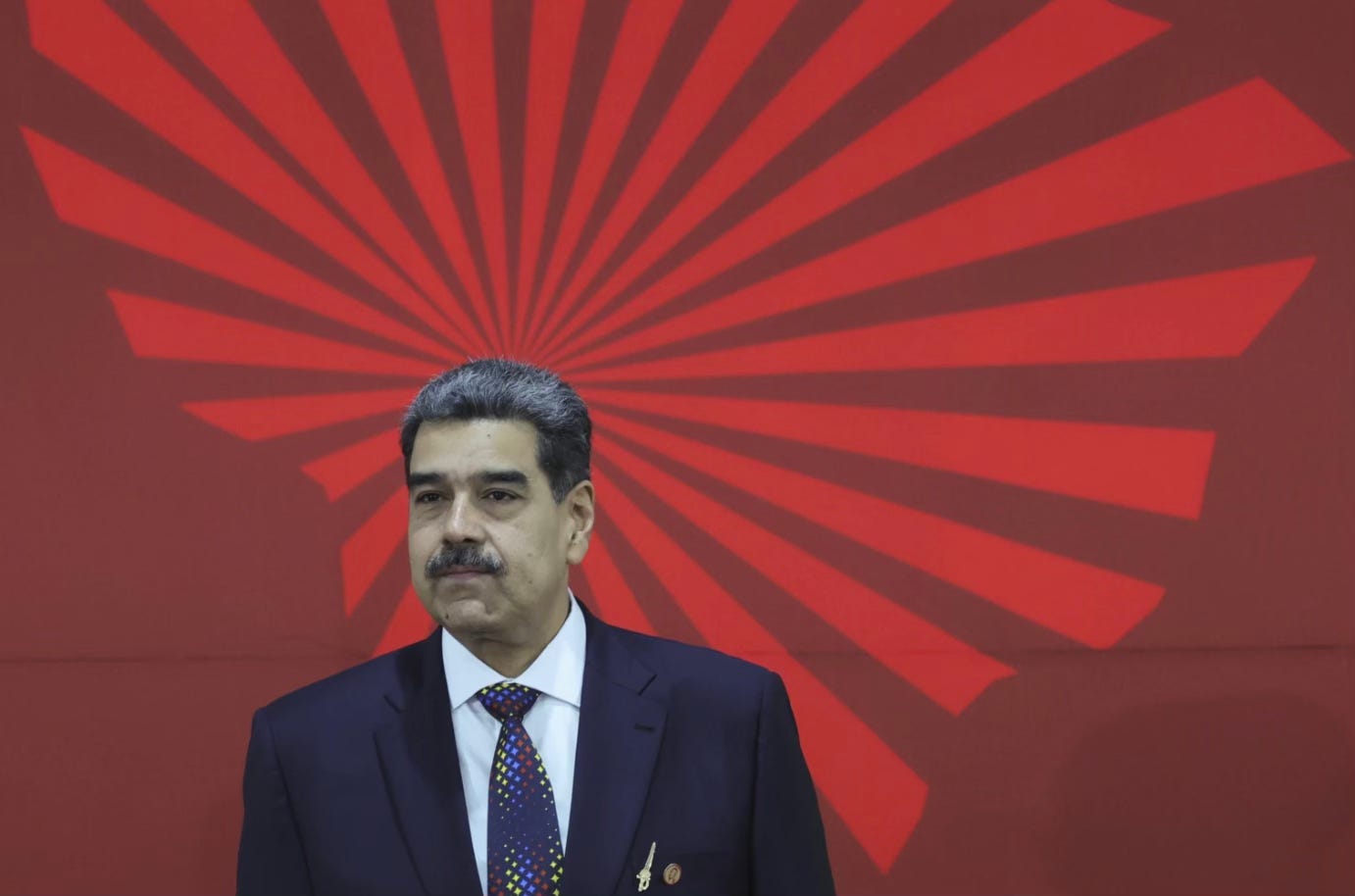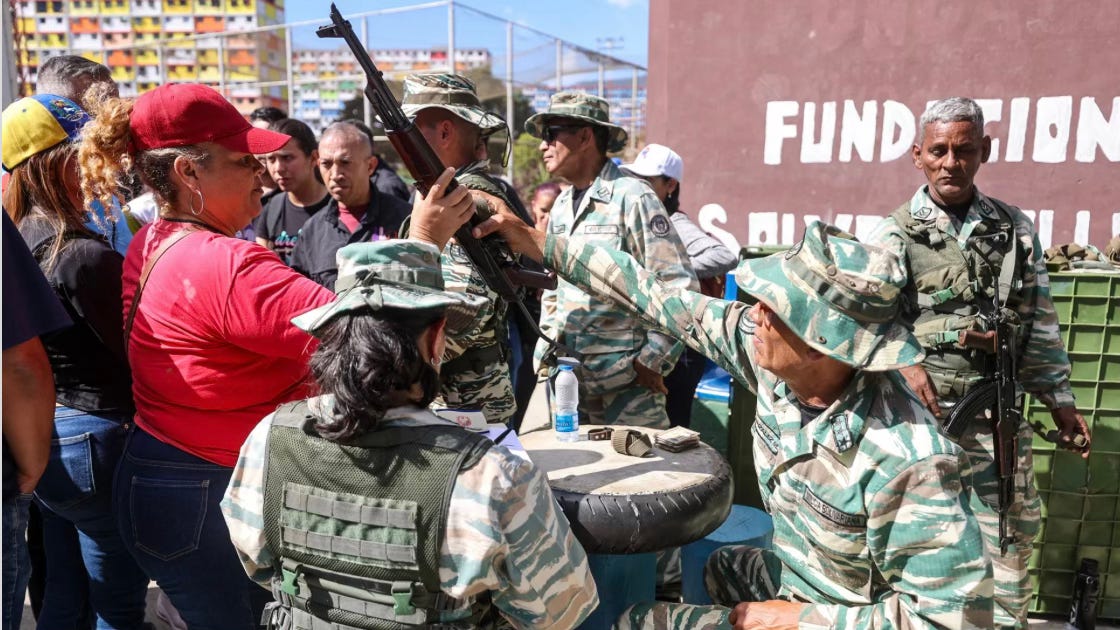On the Ground Military Movement Seen by Pro-Regime Led Forces, At the Wake of Venezuelan Transfer of Power
The streets surrounding the capital of Venezuela, Caracas have “intensified” and “more military presence under the regime orders is being seen,” according to sources familiar with the matter.

The next coming hours are critical for the exodus of the current statehood of Venezuela, a nation that once held democratic ideals and holds the world’s largest oil reserves, has instead been subjected to the political, economic, and social carnage ushered in by the Nicolás Maduro—a nearly two-decade tyranny.
In the latest round-up of arrests issued by the regime, two U.S. citizens were detained earlier this week in Venezuela along with five other members, a move casted out by Nicolás Maduro as the transfer of presidential power is set to take place this Friday.
The regime has claimed that the detained U.S. citizens were of “very high level” but efforts to provide any clarity on the matter or evidence on the arrests have not been provided.
In recent reporting fleshed out by the Associated Press, “as many as 10 Americans,” are found in Venezuelan prison cells. One prisoner by the name of David Estrella, who was last seen in September, was taking a taxi from Colombia to Venezuela with “a bag of perfume, clothes and shoes to gift to friends he made on a previous trip,” according to the Associated Press.
According to the outlet, the State Department has not declared any wrongful detention of the at least 10 Americans captured by the regime.
"Just today we've captured seven foreign mercenaries, including two important mercenaries from the United States," said Maduro on Tuesday in a press conference, who is set to take office for a third term on Friday following last July's contested election that the opposition says it won in a landslide.
Maduro stated that the group of detainees included two Colombians who he said were captured in Venezuela, as well as three others who were brought from the war in Ukraine.
In remarks delivered from the Miraflores, Venezuela’s version of the White House, he claimed that security forces had captured a total of 125 foreign mercenaries from 25 different countries. He said they had entered the South American nation “to practice terrorism against the Venezuelan people”.
Within the scope of those arrests, an estimated 9,000 individuals have been deemed by the Maduro regime as political prisoners, deprived of their humanitarian rights in reports released by a watchdog group, Foro Penal.
The organization has counted at least 47 foreign or duo nationalities from 13 countries among the nearly 1,800 people imprisoned for political reasons in Venezuela. In the previous election, it was around 300 arrests prior to the July presidential election.
As previously reported, in an 11-month investigation detailing the whereabouts of political prisoners affiliated with military operations against the regime: Operation Drone Strike (2018) and Operation Gideon (2020)—the release of these prisoners located in Rodeo I and Yare III have yet to be released.
In late 2023, Venezuela's government released dozens of prisoners including 10 Americans after months of negotiations between Caracas and Washington, while the U.S. released a close ally of Maduro, Colombian businessman Alex Saab.
In a new act of intimidation, the regime deployed weapons to civilians at the Venezuelan capital this week.
The streets surrounding the capital of Venezuela, Caracas have “intensified” and “more military presence under the the regime orders is being seen,” according to sources affiliated with members of political prisoners detained by the regime.
On the ground in Venezuela, many members of the so-called "Bolivarian Militia", a component attached to the Armed Forces but without military training, received Russian assault rifles on Tuesday, January 7, to swear "loyalty" to Nicolás Maduro, who promises to proclaim himself president on January 10.
Images of regime-led militants can be seen handing off Russian-made Kalashnikov rifles in front of the Venezuelan presidential palace—footage and videos can be seen provided by NTN24, a Venezuelan media outlet.

“These bodies integrate all of Venezuela’s power at the national, state, municipal, and communal levels,” he touted, emphasizing the repressive role the ODIS will assume in preempting civil unrest in the final days leading to January 10.
One video circulating on Instagram showed mass groups of civilians at a central regional highway in the state of Miranda, the northern region of Venezuela.
Maduro says he will take the oath for a third six-year term, after dismissing the accusations that he fraudulently stole the election outcome from Edmundo González Urrutia, who is currently at the Presidential palace in Panama City.
The Maduro government has imposed a $100,000 bounty on Mr. González and he would likely be arrested if he returned, as previously reported.
“Thank you Panama!” posted Mr.González on X, “It is an honor to be at your nation fighting for democracy and welcomed by so many Venezuelans.”
As previously reported, on Monday, the Maduro regime put out a statement claiming the efforts of both leaders to engage in conversations about changing the statehood of Venezuela, as “a flagrant violation of international law and a crude attempt to perpetuate imperialist interference in Latin America.”



